 This week the FBI released its much-anticipated annual report on hate crimes committed in 2013, and as with past reports, the news is mixed. To start, it’s clear that hate crimes of every sort—and racial, religious and anti-gay hate crimes in particular—continued for another year at a depressingly steady level throughout the country.
This week the FBI released its much-anticipated annual report on hate crimes committed in 2013, and as with past reports, the news is mixed. To start, it’s clear that hate crimes of every sort—and racial, religious and anti-gay hate crimes in particular—continued for another year at a depressingly steady level throughout the country.
On at least 5,928 occasions last year (the ones that were actually reported), people or property came under attack due to bias against a minority community, producing 6,933 specific criminal charges. That’s an incident, on average, about every hour and a half, all year long, which is about the same rate that’s held true since statistics started being gathered 23 years ago.
The current system for reporting local hate crimes to the federal government is completely voluntary, but in 2013 about 15,000 law enforcement agencies participated (83% of all agencies, up from 72% last year). We are grateful to have this much information to work with in order to size up the threat to people’s well-being and our social health.
One thing we have clearly learned from the yearly reports is that about one in every five hate crimes is against a person due to their sexual orientation: three or four every day, because they are gay, lesbian, bisexual, or indeed, 24 times in 2014 because they are heterosexual. Sexual orientation is the second highest category, after race. Given that it took more than a decade of legislative struggle to add sexual orientation to the law, this is a remarkable number, one that should forever end the debate over whether these changes were needed.
We’ve also learned, thanks to changes made in the Matthew Shepard and James Byrd Jr. Hate Crimes Prevention Act, that hate crimes committed due to victims’ perceived gender or gender identity, are now being tallied at about half a percent of all hate crimes. This is the first year any such data has been collected, which is progress. But the very low number most likely suggests a lack of law-enforcement awareness or training, and a deeper difficulty in getting these crimes brought to police attention in the first place. Trans* lives deserve our urgent attention and that must start with greater public-safety agency awareness and sensitivity nationwide.
But for everything this information tells us, the missing information from the remaining 17% of agencies who didn’t report hate crimes in their communities is detrimental to our cause and the LGBT community as a whole. And we know that an overwhelming number of our largest cities who technically do report, still severely under-report hate crimes of every type.
While any reporting is useful and deserves our encouragement, the public’s understanding of the actual state of hate crimes will remain unclear so long as reporting is inconsistent and voluntary. In 2015, we are prioritizing expansion of hate crimes prevention efforts, and strengthening anti-hate legislation, including making high-quality and consistent reporting a best practice for all law enforcement agencies.
Although there are modest improvements in some years, since these annual reports began there have never been fewer than three hate crime murders in any given year. People murder each other every year for their race, sexual orientation, ethnicity or religion—or for all of those factors. In 1998, thirteen people were killed this way, including Matthew and James Byrd, Jr., and we can’t escape the reality that year after year we’re still losing family, friends and brothers and sisters of the community to brutal, violent hate crimes.
As the Foundation launches its new hate-crime reporting and prevention initiative in 2015, we ask for your help improving public safety in your community. Email media@matthewshepard.org for more information on getting involved.
Additionally, we are extremely disappointed to hear the news about the non-discrimination ordinance being overturned in Fayetteville, Arkansas. Sadly, we still live in world where being authentic and open about one’s sexual orientation or gender identity has consequences beyond social acceptance—people in the LGBT community can lose their jobs, their homes, their sense of security in their town. Our message is not to those who support hate and discrimination, but to those who continue to fight for equality and safety for all citizens, regardless of race, sexual orientation, ethnicity, gender and gender expression. The Matthew Shepard Foundation fully supports all who have the courage to continue advocating for equality. Do not lose hope.

